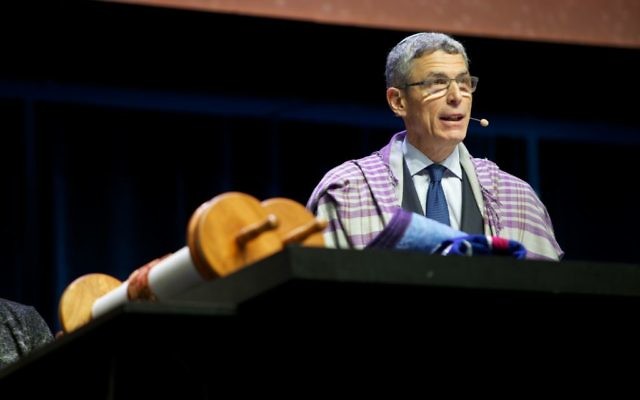Reform Biennial Expresses Tension With Israel
Is it time to recognize two centers of Jewish life in the world?
The president of the Union for Reform Judaism has called for greater recognition of the role American Jews play in guiding the destiny of the Jewish people.
It’s time to “stop thinking that Israel unilaterally sets the agenda for world Jewry,” Rabbi Rick Jacobs told the largest URJ gathering ever in his d’var Torah during morning services Saturday morning, Dec. 9, in the impressive worship setting carved out of the cavernous auditorium of the Hynes Convention Center in Boston.
“The time has come,” Rabbi Jacobs told the nearly 6,000 people attending the URJ biennial conference, to “replace it with an ethos of an interdependent, mutually responsible world Jewish community with two powerful centers, North America and Israel.”
His call for a greater voice for the Reform movement in world Jewish affairs came near the end of a year in which Israel’s relations with non-Orthodox Jewish communities around the world plummeted amid anger over government actions.
The Israeli government this year introduced legislation that would have strengthened the power of the ultra-Orthodox Chief Rabbinate in determining the legitimacy of Jewish conversions of people seeking to immigrate to Israel. And Prime Minister Benjamin Netanyahu froze an agreement reached after years of negotiations to build an egalitarian, pluralistic prayer space at the Kotel and give non-Orthodox Jews a role in the governance of the Western Wall.

Israeli Minister of Tourism Yariv Levin was quoted in recent weeks as saying that non-Orthodox Jews don’t deserve a place at the Kotel “because they’ll be gone in another couple of years due to assimilation and intermarriage.”
Rabbi Jacobs, who leads the largest American Jewish denomination, cautioned in his address that “we are coming alarmingly close” to the breaking point in the movement’s relationship with the Israeli government.
Leading the Shacharit service for 6,000 people Saturday morning was Rabbi Peter Berg of The Temple, who said during an unrelated event back in Atlanta that it was “the most challenging rabbinic assignment I’ve ever had in my career.”
In commenting on Rabbi Jacobs’ remarks in Boston, he said: “The ultra-Orthodox have turned a cold shoulder on the concerns of the majority of Israelis. Additionally, too many religious and civic leaders in Israel are ignorant about Jewish life in America. Reform has a major role to play in building bridges between our communities.”
The strongly worded speech to the leaders of Reform Judaism came just three days after President Donald Trump made public his decision to recognize Jerusalem as Israel’s capital.
It was a decision met with a mixed response at the Reform biennial. An official URJ statement called the decision “ill-timed.”
“We cannot support his decision to begin preparing that move now, absent a comprehensive plan for a peace process,” the URJ said.
That position was reflected in a public statement on behalf of the clergy at Temple Sinai in Sandy Springs, whose senior rabbi, Ron Segal, led a sizable delegation to the Reform convention.
“Just as Jerusalem lies at the heart of the Jewish people, our Palestinian neighbors also possess intrinsic ties to the city of Jerusalem,” the Sinai clergy statement said. “Our team, like many of you, is wrestling with conflicting emotions and responses.”
Attendees at the biennial heard a call for the creation of a “reverse Birthright” that would bring Israelis to American Jewish communities in much the same way that some 600,000 young American Jews have been introduced to life in Israel.
The Reform movement, Rabbi Jacobs said, “should not underestimate the power Israelis experience when they spend time here with us.”
“Let each of us search for our brothers and sisters in Israel,” he said, “knowing that the only way we will find them is not by looking from afar, but rather by leaning in closer than ever.”
Despite tension between the URJ and Israel’s government, the Reform movement is growing there. Reform congregations, which unlike their Orthodox counterparts do not receive government subsidies, have doubled in Israel the past two years, and public acceptance there of the Reform movement is at a historic high. The 100th native Israeli Reform rabbi recently was ordained.
A large Israeli delegation was among the attendees from 12 foreign countries who joined the Reform biennial in Boston.
In addition to expressing their concern over the direction of Israeli policies, delegates approved resolutions on racial justice, climate change, sexual violence in schools and the global refugee crisis.
Photos courtesy of the Union for Reform Judaism




comments